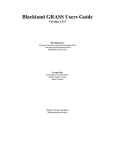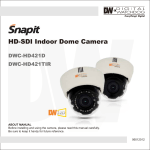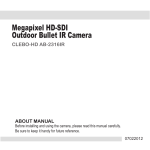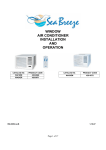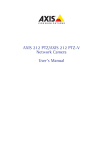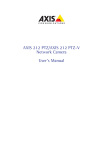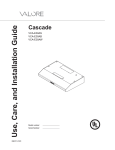Download Sea Breeze 420-0075 Operating instructions
Transcript
WINDOW AIR CONDITIONER INSTALLATION AND OPERATION CATALOG NO. WH18ZM PRODUCT CODE 420-0075 950-0054-revB 6-29-07 Page 1 of 17 TABLE OF CONTENTS AIR CONDITIONER SAFETY………………………………………………………………..….2 NORMAL CARE AND MAINTENANCE…………………………………………………........3 INSTALLATION REQUIREMENTS………………………………………………………........5 INSTALLATION INSTRUCTIONS………………………………………………………………6 THRU-WALL INSTALLATION INSTRUCTIONS……………………………………………11 GENERAL OPERATING INSTRUCTIONS…………………………………………………..13 OPERATING CONTROLS……………………………………………………………………..14 TROUBLESHOOTING………………………………………………………………………….15 SPECIFICATIONS………………………………………………………………………….......16 WARRANTY……………………………………………………………………………………..17 TECHNICAL SUPPORT IF YOU NEED TECHNICAL SUPPORT, PLEASE CALL 1 (704) 504-8590 BETWEEN 8:00 AM TO 4:00 P.M. WHEN CALLING FOR TECHNICAL SUPPORT, PLEASE HAVE COMPLETE MODEL AND SERIAL NUMBER AVAILABLE. AIR CONDITIONER SAFETY Your safety and the safety of others is very important. We have provided many important safety messages in this manual and on your appliance. Always read and follow all safety instructions. This is the safety alert symbol. This symbol alerts you to potential hazards that can kill or hurt you and others. All safety messages will follow the safety alert symbol and the word “DANGER” or “WARNING”. These words mean You can be seriously injured if instructions are not followed. Bodily injury or damage to personal property may occur if instructions are not followed. All safety messages will tell you what the potential hazard is, tell you how to reduce the chance of injury, and tell you what can happen if the instructions are not followed. Page 2 of 17 Electrical Requirements Grounding Instructions This appliance is equipped with a three-prong grounding plug for protection against possible shock hazards. If a two-prong wall receptacle is encountered, the customer is required to contact a qualified electrician and have the two-prong receptacle replaced with a properly grounded threeprong wall receptacle in accordance with the National Electrical Code. Room air conditioners are designed to operate according to requirements on the nameplate and as shown in Table 1. Do not plug models marked “Use on Single Outlet Circuit Only” into a circuit with another appliance or light fixture. Installation Complete step-by-step installation instructions are furnished with your unit. These instructions will be found on a separate page included with this manual or in the mounting kit assembly. Follow these instructions carefully. Keep these instructions with this manual for future reference. Your unit will be one of the following designs: • Unit with a window mounting kit. These models are designed for mounting through an opening in a wall. These units can be adapted to window installation by using the optional window mounting kit supplied with your unit. • Unit without a window mounting kit. No window mounting kit is supplied with the unit. These models are designed for mounting through an opening in a wall. These units can be adapted to window installation by purchasing an optional window mounting kit. Consult your dealer to choose the kit that is appropriate for your model and installation. Room Air Conditioner/Heating Units Heat model is by electric heating elements. See the specification sheet for electrical data information. Normal Care and Maintenance Receptacle Wiring Receptacle wiring must be of adequate size for the unit. Refer to the unit identification plate for exact power requirements. Minimum size of wiring, based on power requirements, is: Units up to 20 amps: 12 Gauge 20-30 amp units: 10 Gauge LCDI or AFCI Power Cords Underwriters Laboratories (UL) and the National electric Code (NEC) now require power cords that sense current leakage and can open the electrical circuit to the unit. In the event the unit does not operate, check the reset button located on or near the head of the power cord as part of the normal troubleshooting procedure. Use copper wire only. The consumer’s responsibility is to provide proper and adequate receptacle wiring that conforms to all applicable codes. All wiring should be installed by a qualified electrician. Annual Inspection It is suggested that your unit be inspected by your dealer or qualified technician once a year. It is advisable to have the outer case removed and the unit thoroughly cleaned. NOTE: The life of your unit may be greatly reduced if you live in a salt air or other corrosive type environment. Under these conditions, the unit should be removed from its case and completely cleaned at least once a year. At that time any scratches or blisters on the painted surfaces should be sanded and repainted. Placing an algaecide tablet in the outdoor side of the unit’s base is suggested in humid areas where algae formation is common. Page 3 of 17 Front Grill and filter removal The front contains a removable grill that provides easy access to the air filter. To clean the filter, grasp the filter handle and slide the filter out of the unit. Front Grill and Cabinet Cleaning Grill and cabinet may be cleaned with warm water and mild soap or detergent. Cleaning and polishing compounds are not recommended as they may damage plastic surfaces. Air Filter Cleaning A dirty air filter reduces operating efficiency of the unit. The filter should be inspected at least once every week during operation. Clean the filter with a vacuum cleaner, or wash in warm water and mild detergent. The filter should be thoroughly dried before replacing in the unit. Do not operate the unit without the filter in place. 1. Remove two side Phillips screws attaching front to case 2. Remove inlet panel by pulling and lifting out bottom. Reinstall air filter and grill by reversing removal procedure. 3. Remove Phillips screws on bottom right of inlet panel area and remove front panel. 4. If the unit has a screw holding the base pan clip to the chassis, remove the screw. 5. Using base pan handle, pull the chassis straight out, slowly and evenly, until approximately 9 ½ inches extends from the outer case. Use both hands to grasp the base pan and pull the remaining chassis from the outer case. Fan Motor Care The fan motor is permanently lubricated for long life. There is no need to oil the motor. Slide-out Chassis Removal from Outer Case See Figure H. NOTE: Base pan clip is shipped in a plastic bag with mounting screw and condensate drain cup. Install the clip after reinserting the chassis into the outer case to prevent accidental chassis removal. Page 4 of 17 IMPORTANT SAFETY INSTRUCTIONS WARNING: To reduce the risk of fire, electrical shock, or injury when using your air conditioner: follow these basic precautions: • Plug into a grounded 3 prong outlet. • Do not remove ground prong. • Do not use an adapter. • Do not use an extension cord. • Unplug air conditioner before servicing. • Use two or more people to move and install this air conditioner. SAVE THESE INSTRUCTIONS INSTALLATION REQUIREMENTS BEFORE YOU BEGIN Read these instructions completely and carefully. IMPORTANT – Save these instructions for local inspector’s use. IMPORTANT – Observe all governing codes and ordinances. Note to Installer – Be sure to leave these instructions with the Consumer. Note to Consumer – Keep these instructions for future reference. Skill level – Installation of this appliance require basic mechanical skills. Completion time – Approximately 1 hour. We recommend that two people install this product. Proper installation is the responsibility of the installer. Product failure due to improper installation is not covered under the Warranty. ELECTRICAL REQUIREMENTS Ground wire must be connected to ground screw located in lower right corner of air conditioner when air conditioner is in cabinet. The electrical ratings for your air conditioner are listed on the model and serial number label. The model and serial number is located on the side panel of the unit. Specific electrical requirements are listed in the chart below. Follow the requirements for the type of plug on the power supply cord. Power Cord Wiring Requirement NOTE: The power cord includes a current interrupter device. A test and reset button is provided on the plug case. The device should be tested on a periodic basis by first pressing the TEST button and then the RESET button. If the TEST button does not trip, or if the RESET button will not stay engaged, discontinue use of the air conditioner and contact a qualified service technician. Page 5 of 17 INSTALLATION INSTRUCTIONS Tools you will need: • • • • • • • Adjustable Wrench Phillips Head Screwdriver Flat Blade Screwdriver Pencil Ruler or tape measure Level Scissors or knife Page 6 of 17 WINDOW REQUIREMENTS These instructions are for a standard double-hung window. You will need to modify them for other types of window. The air conditioner can be installed without the accordion panels if needed to fit in a narrow window. See the window opening dimensions. All supporting parts must be secured to firm wood, masonry or metal. The electrical outlet must be within reach of the power cord. REMOVE THE AIR CONDITIONER FROM THE CASE Remove the 2 shipping screws (if present) from the back of the case and discard them. Remove the locking screw and locking bracket from the lower frame. Save to reinstall later. Remove the ground screw and save to reinstall later. Slide the air conditioner from the case by gripping the base pan handle and pulling forward while bracing the case. WINDOW REQUIREMENTS A storm window frame will not allow the air conditioner to tilt toward the outside, and will keep it from draining properly. To adjust for this, attach a piece of wood to the stool. WOOD PIECES: Width:2” LENGTH: Long enough to fit inside the window frame. THICKNESS: To determine the thickness, place a piece of wood on the stool to make it 1/2” higher than the top of the storm window frame. Attach securely with nails or screws provided by the installer. PREPARE THE WINDOW Cut the window sash seal to the proper length. Peel off the backing and attach the seal to the underside of the window sash. Page 7 of 17 PREPARE THE CASE Install the top mounting rail with 4 type B screws from inside the case. Insert the frames for the accordion panels into the top mounting rail and the bottom frame guides. Attach the accordion panels to the side of the case using 3 types A screws on each side. NOTE: When attaching the accordion panels, make sure to only screw the inner panels to the case sides. INSTALL THE CASE IN THE WINDOW Carefully slide the case into the window and center the case. Lower the window behind the top mounting rail. Pull the bottom of the case forward so that the bottom mounting rail is tight against the back of the window stool. Mount the case to the window sill using 4 type E screws. Drill pilot holes if necessary. Make sure the bolts and nuts are all of the way in on both the left and right V-Supports. Position the V-supports on the case bottom so that they will be near the outside wall. Attach a Vsupport to each side of the bottom of the case using 3 type C screws on each side. Adjust the leveling bolts and nuts against the outside wall so that the case has a slight tilt to the outside. Tighten nuts with an adjustable wrench. Use a level; about a ½ bubble will be the correct case slant to the outside. Page 8 of 17 INSTALL THE CASE IN THE WINDOW (CONT.) Use a wood block (obtained locally) between the leveling bolts and the wall if the wall is weak or if the weight of the air conditioner falls between the studs in the wall. Cut the foam top window gasket to the window width. Stuff the foam between the glass and the window to prevent air and insects from getting into the room. INSTALL THE AIR CONDITIONER IN THE CASE Extend the left and right accordion panels to the vertical window sashes. Drill pilot holes and attach the top and bottom corners with 4 type D screws. Slide the air conditioner into the case. Do not push on the controls or the finned coils. Make sure the air conditioner is firmly seated. Reinstall the locking bracket and screw removed earlier. INSTALL SUPPORT BRACKETS AND THE FOAM TOP WINDOW GASKET Attach the support brackets with two type E screws, one on each side. Reconnect the ground wire to the air conditioner using the screw removed earlier. IMPORTANT: The ground wire must be reinstalled to ensure a proper ground. Page 9 of 17 INSTALL THE AIR CONDITIONER IN THE CASE (CONT.) Secure the front grill frame to the case with one type C screw. Remove the front grill from its box and remove the shipping tape. Grasp the inlet grill at the bottom corners and pull it forward. Unhook it from its top hinges and set aside. Using the tab, pull slightly on the filter to release it and pull it down and out. Pull the coiled power cord from its shipped position in the air discharge area. Attach the front grill frame to the case by inserting the tabs on the grill frame into the slots on the top front of the case. Push the grill frame in, and install the 2 side screws at bottom left and right side of front panel. Reinstall the filter. Reinstall the inlet grill. Connect power. Page 10 of 17 THRU-WALL INSTALLATION INSTRUCTIONS INTRODUCTION This instruction provides guidelines for installing a compact air conditioner through an outside wall. Air conditioner Dimensions The following figures show the outside dimensions of the air conditioner with the chassis installed, and dimensions of the outer case with the chassis removed. Outer Case Dimensions (Chassis removed) General Instructions All compact Room Air conditioners feature a slideout chassis. Chassis and front cover must be removed from outer case for installation. A finished opening 26 3/16” wide x 17” high is recommended. The lower left inside corner of the opening must be within 5 feet of an appropriate electrical outlet. When wall thickness exceeds 9 3/8”, the opening must be modified to allow air to enter the side louvers on the case (see special instructions on back.) do not install the air conditioner in walls thicker than 11 ¾”. Page 11 of 17 GENERAL INSTRUCTIONS (CONT.) Masonry Construction See CAUTION under General Instructions. In masonry walls, cut or build a finished opening 17” high by 26 3/16” wide. When case is properly positioned in opening, secure it in place with mortar or concrete nails driven through holes in sides of outer case (shim case and pre-drill holes before securing with nails). Placement of Outer Case in Opening Place the outer case in the opening, flush against one side of the opening. Use a carpenter’s level and ensure case is level from side to side and has a 3/8” slope from front to back (back of case must be 3/8” lower than front to ensure proper condensate drainage). If needed, use shims to level case (from side to side) and to obtain proper back slope. Front of case must project ¾” (minimum) beyond inside wall in order to attach the air conditioner front frame. If framing indoor side of opening with wood molding (or other decorative materialo), extend outer case ¾” beyond molding. When case is properly positioned in opening, use wood shims to fill any gaps between case and finished opening, especially in areas where the case will be secured to the opening. Take care not to warp or distort the case when installing shims. For condensate drainage, install the drainage cup in the drain hole on the base plate of the case. Brick Veneer or Frame Wall Construction See CAUTION under General Instructions. Cut or build rough opening large enough to allow a framed, finished opening 17” high and 26 3/16” wide. When case is properly finished in opening, secure it in place with mortar or concrete nails driven through holes in sides of outer case (shim case and pre-drill holes before securing with nails). Framed/Finished Opening (brick veneer or fame wall construction) Installation in Wall Thicker than 8 ½” The side louvers in outercase provide ventilation to air conditioner compressor and fan motor and must not be blocked. When installing unit in a wall over 9 3/8” thick, provisions must be made in wall opening to ensure free air flow to the side louvers. This can be accomplished by chamfering the vertical portions of the outside opening as shown. Page 12 of 17 Ventilation louvers on top of case must not be obstructed. Do not attempt to install unit in walls thicker than 11 3/4 inches. _________________________________________________________________________________________ GENERAL OPERATING INSTRUCTIONS While operation of all units is similar, controls vary slightly from model. Operating Controls section shows control panel of unit purchased and gives detailed information about operation of controls. Air Around Unit Select the highest fan speed and set the temperature control to its coldest position. When the desired temperature is reached, slowly move the temperature control toward a warmer setting until the compressor shuts off. The thermostat will then cycle the compressor on and off to maintain this selected temperature. Adjust the fan speed for desired air circulation. Changing Airflow Direction Baffles Airflow of unit may be diverted left or right from center by baffles. Upward and downward air discharge is provided by tilting louvers. Adjust baffles and tilt louvers for desired airflow pattern. Drain Cup Installation and Use Your air conditioner uses a system where the water removed from the indoor air (condensate) is channeled to the outdoor side of the unit. The outdoor fan blade has a “slinger” ring attached to it that dips into the water and slings the water onto the outdoor coil surface. This is the sound of water you hear during normal operation. The water quickly evaporates on this warm surface and improves the efficiency of your air conditioner. However in very humid conditions excess amounts of water may drip off the unit chassis. If this proves to be a problem, install the condensate drain cup included with the unit to route excess water where it would not be a problem. To install, remove the unit chassis from the outer case. Insert the condensate drain cup through the recessed ½” hole on the back center of the outer case. Once inserted, place a ½” diameter hose or tube on the drain cup bottom spout. The hose allows you to route where you want the excess water to go. Reinsert the unit chassis into the outer case. The unit base pan overflow hole will be positioned directly above the drain cup and will catch any water that might drain out. Airflow Around Unit Check the indoor grill and outdoor louvers for obstructions to air flow. Do not block the airflow to and from the unit. If air is obstructed and/or deflected back into the unit, the air conditioner’s compressor may cycle on and off rapidly. This could damage your unit. Page 13 of 17 OPERATING CONTROLS Fan Control OFF Completely shuts off the unit. To prevent blowing fuses, wait two minutes after turning the unit off before turning it on again. LOW COOL Filters and circulates room air with the fan running continuously on low speed. Also cools and dehumidifies while the compressor is running. Select this setting for quiet cooling operation HIGH COOL Filters and circulates room air with the fan running continuously on high speed. Also cools and dehumidifies while the compressor is running. Select this setting for maximum air circulation and cooling effect. LOW HEAT Filters and circulates room air with the fan running continuously on low sp-eed. Also heats while the compressor or electric heat is running. Select this setting for quiet heating operation. HIGH HEAT Filters and circulates room air with the fan running continuously on high speed. Also heats while the compressor or electric heater is running. Select this setting for maximum air circulation and heating effect. FAN ONLY Select this setting for circulating or exhausting room air without heating or cooling. Temperature Control Turn this control to the left for a warmer room temperature, to the right for a cooler room temperature. Vent Control (On Some Models) Choose one of the following two settings by sliding the vent control under the appropriate marking: • EXHAUST Exhausts room air to the outdoors. Also circulates and filters room air. This position can be used to exhaust stale or smoky air. To conserve energy, it is advised that the Fan Control be in the Fan Only setting when using this feature. • CLOSED Exhaust damper is closed. Unit circulates and filters room air. This position should be used for normal cooling operation. Circulair This control allows you to circulate the air across the room. When in the ON position, vertical louvers in the air outlet grill are moved back and forth distributing the air throughout the room. When in the OFF position, the vertical louvers in the air outlet remain pointed in the direction they were when the switch was moved to the OFF position. Page 14 of 17 TROUBLESHOOTING The following is a list of problems that are sometimes encountered when using a room air conditioner. Possible cause and suggested remedies are given for each problem. • UNIT WILL NOT RUN Push reset button on power cord. Set Fan Control to position other than OFF. Make sure plug is firmly seated in outlet. Check for blown fuses, tripped circuit breakers. • LITTLE OR NO COOLING / LITTLE OR NO HEATING (fan and compressor run) Set vent to CLOSED Remove obstruction from indoor grill or outdoor louvers. Dirty air filter. Clean or replace as needed. Check with dealer to determine proper capacity unit for application. Page 15 of 17 • NOISY UNIT Tighten any loose parts. Provide additional support for unit. Normal in high humidity. Stop noise by removing drain plug or adding condensate drain cup. Check with dealer to determine proper capacity unit for application. • MOUNTING SUPPORT NOT INSTALLED Some models require removal of storm window frame before installation. • FROST ON INDOOR COIL Clean air filter by vacuuming or washing with water and mild soap. Turn Temperature Control to warmer setting reduces occurrence and duration of frost. TECHNICAL SPECIFICATIONS MODEL BTU COOLING BTU HEATING EER RATING DEHUMIDIFICATION (pints/hour) AIRFLOW (CFM) VOLTAGE FREQUENCY AMPS COOLING AMPS HEATING WATTS COOLING WATTS HEATING PLUG TYPE POWER CORD RATING (amps) POWER CORD TYPE POWER CORD LENGTH REFRIGERANT REFRIGERANT CHARGE (oz. / lbs ) SOUND (INSIDE/OUTSIDE) dba (MAX) 4 WAY AIR ADJUSTMENT 2 WAY AIR SWING AIR DISCHARGE MOTOR TYHPE MOTOR CAPACITOR CONTROLS THERMOSTAT TEMP °F CABINET SIZE (INCHES) WIDTH DEPTH HEIGHT WINDOW OPENING WIDTH THRU WALL MAX THICKNESS WEIGHT (lbs.) (Gross / Net) APPROVALS TABLE 1 Page 16 of 17 WH18ZM 18,000 – 17,600 11,000 – 8,600 9.7 4.2 450 (MAX) 230 – 208 VAC 60 HZ 8.2 – 8.75 15.4 – 13.93 1885 – 1850 3500 TYPE C 20 LCDI 6’ R22 27.84 / 1.74 59 / 63 YES YES SIDE BALL BEARING 7 µfd MECHANICAL 61°F to 89°F 26” 27 7/8” 16 7/8” 30 – 46” 8.5” 163 / 150 UL/CUL WARRANTY International Refrigeration Products warrants the she product supplied is free from defects in material and workmanship. This warranty is valid as long as this product is properly handled, installed, operated and serviced in accordance with the Installation and Operating Instructions shipped with this unit, and warranty card is completed and mailed no later than 30 days after date of purchase. All warranty claims must be made within one (1) year (five (5) years for compressor) from date of purchase (unless national regulations require a longer registration period). This warranty provides free replacement of defective parts only. Labor, Service calls, and replacement parts as a result of normal wear and tear are not covered under this warranty. Additional claims are excluded, unless required by national regulations. International Refrigeration Products inc. is not responsible for incidental, consequential, direct, or indirect damage or expenses relating to the use of, or the inability to use he product for any purpose. Other implied warranties are excluded. This constitutes International Refrigeration Products warranty obligation and replaces any and all prior warranties for this product. INTERNATIONAL REFRIGERATION PRODUCTS INC. 11325 Nations Ford Rd. Charlotte, NC 28134-8393 (704) 504-8590 Phone (704) 504-3023 Fax Copyright 2006 IRP INC. 950-0054 Page 17 of 17


















